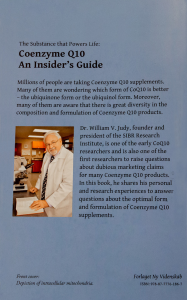
Dr. William Judy has been doing clinical research with CoQ10 treatment of heart failure patients for 40 years. The heart muscle tissue of heart failure patients is known to be deficient in Coenzyme Q10. Three times 100 milligrams of Coenzyme Q10 per day added to conventional heart failure medicine improves the patients’ quality of life and chances of survival as compared to placebo together with conventional treatment.
Heart failure is what happens when the heart is no longer able to pump out blood as strongly as it should. It occurs when the heart is too weak or too stiff to fill up with blood and pump out blood efficiently. It is characterized by reduced functional capacity and reduced quality of life:
- Reduced ability to exercise and do work
- Shortness of breath
- Swelling in the lower extremities
- Weakness and fatigue from exertion
Heart failure is one of the most costly medical conditions in terms of complications and hospitalizations. The costs of medical care for heart failure patients is expected to rise from $30 billion per year in 2018 to nearly $70 million by 2030 [Bhatt & Butler 2018].
Half of the patients diagnosed with heart failure die within five years of the diagnosis. Heart failure is a frequent cause of hospitalization and loss of physical function [Jafari 2018].
Q-Symbio Study of Coenzyme Q10 and Heart Failure
The Q-Symbio Study of the adjunctive treatment with 300 milligrams of Coenzyme Q10 daily for two years together with conventional heart failure medicine improved patients’ symptoms and survival significantly compared to placebo together with conventional heart failure medicine [Mortensen 2014].
Furthermore, the clinical benefits of Coenzyme Q10 supplementation in the prevention and treatment of heart failure have been documented in several randomized controlled trials enrolling a total of 4668 cardiovascular disease patients [Jafari 2018]:
- improved ejection fraction
- improved New York Heart Association classification
- improved physical status
- improved survival
- better quality of life
How Does CoQ10 Adjunctive Treatment Help Heart Failure Patients?
Serum and plasma CoQ10 levels are generally lower in heart failure patients. Supplementation is needed to make up for the loss.
The Q-Symbio Study (n=420) and its forerunners, the Morisco Multi-Center Study (n=641) and the Baggio Multi-Center Study (n=2664), have shown that CoQ10 adjunctive treatment is safe, well-tolerated, and effective with moderate to severe heart failure patients. Moreover, it is an affordable add-on treatment that can save patients and hospitals much money in terms of fewer complications and fewer hospitalizations [Mortensen 2014; Morisco 1993; Baggio 1993].

In his Insider’s Guide to Coenzyme Q10, now available from amazon.com, Dr. Judy has written about the clinical benefits of CoQ10 supplementation.
The Heart Health Effects of Adjunctive CoQ10 Treatment
Jafari et al [2018] enumerate three reasons for the effectiveness of CoQ10 treatment of heart failure patients:
- Coenzyme Q10 is an essential bio-nutrient for the cellular generation of adenosine triphosphate (ATP) energy.
- Coenzyme Q10 reduces oxidative stress, high levels of which are a bio-marker of mortality in heart failure. In its reduced form, Coenzyme Q10 is a fat-soluble antioxidant that prevents membrane oxidation and lipid peroxidation.
- Coenzyme Q10 stabilizes calcium dependent ion channels in the heart muscle tissue.
Beyond these three biological functions, Coenzyme Q10 also provides the following benefits [Jafari 2018]:
- CoQ10 adjunctive treatment improves endothelial function, which is important for the contraction and relaxation of blood vessels and important for blood platelet adhesion and blood clotting.
- CoQ10 adjunctive treatment improves left ventricle contractility in patients with congestive heart failure.
Coenzyme Q10 Supplementation and Reduced Levels of Chronic Inflammation
Zhai et al in a 2017 systematic review point to evidence from randomized controlled trials that show that CoQ10 supplementation reduces the levels of known bio-markers for chronic inflammation.
The evidence from the KiSel-10 Study of the Effect of combined CoQ10 and selenium supplementation on the heart function and cardiovascular mortality of health senior citizens shows that the combined treatment reduces the blood levels of bio-markers for chronic inflammation [Alehagen 2015; Alehagen 2019].
Summary: CoQ10 Adjunctive Treatment for Heart Failure
Admittedly, different types of chronic heart failure may be associated with different responses to the CoQ10 adjunctive treatment, and individuals diagnosed with heart failure may respond differently to the CoQ10 adjunctive treatment.
Even so, the available evidence from randomized controlled trials suggests that CoQ10 adjuvant treatment can improve the symptoms and quality of life and survival of patients with heart failure [Ayers 2018].
The beneficial effects of CoQ10 supplementation on cellular energy generation, antioxidant defense of cells, maintenance of endothelial function, and chronic inflammation may explain the positive results seen in clinical trials of heart failure.
Important point: Not all Coenzyme Q10 supplements are equally well absorbed. The crystalline CoQ10 raw material is difficult to work with and difficult to dissolve at body temperature to single molecules. This is important because the human body cannot absorb CoQ10 crystals, only single CoQ10 molecules. Good quality manufacturing costs time and money. The best commercial CoQ10 supplements in terms of absorption and health benefits are not going to be the cheap formulations on the shelf.
Read our key article about CoQ10 and cardiovascular health in elderly people
Read our key article on CoQ10 as adjuvant therapy for heart failure
Sources
Alehagen, U., Lindahl, T. L., Aaseth, J., Svensson, E., & Johansson, P. (2015). Levels of sP-selectin and hs-CRP Decrease with Dietary Intervention with Selenium and Coenzyme Q10 Combined: A Secondary Analysis of a Randomized Clinical Trial. Plos One, 10(9), e0137680.
Alehagen, U., Alexander, J., Aaseth, J. & Larsson, A. (2019). Decrease in inflammatory biomarker concentration by intervention with selenium and Coenzyme Q10: a sub-analysis of osteopontin, osteoprotergerin, TNFr1, TNFr2, and TWEAK. Journal of Inflammation, 16,5,1-9.
Ayers J, Cook J, Koenig RA, Sisson EM, & Dixon DL. (2018). Recent developments in the role of coenzyme q10 for coronary heart disease: a systematic review. Curr Atheroscler Rep; 20(6):29.
Baggio, E., Gandini, R., Plancher, A. C., Passeri, M., & Carmosino, G. (1993). Italian multicenter study on the safety and efficacy of coenzyme Q10 as adjunctive therapy in heart failure (interim analysis). The CoQ10 Drug Surveillance Investigators. The Clinical Investigator, 71(8 Suppl), S145-S149.
Bhatt, KN & Butler J. (2018). Myocardial energetics and heart failure: a review of recent therapeutic trials. Current Heart Failure Reports; 15(3): 191-197.
Jafari M, Mousavi SM, Asgharzadeh A, Yazdani N. (2018). Coenzyme Q10 in the treatment of heart failure: A systematic review of systematic reviews. Indian Heart J; 70 Suppl 1: S111-S117.
Morisco, C., Trimarco, B., & Condorelli, M. (1993). Effect of coenzyme Q10 therapy in patients with congestive heart failure: a long-term multicenter randomized study. The Clinical Investigator; 71(8 Suppl), S134-S136.
Mortensen, S. A., Rosenfeldt, F., Kumar, A., Dolliner, P., Filipiak, K. J., Pella, D., & Littarru, G. P. (2014). The effect of coenzyme Q10 on morbidity and mortality in chronic heart failure: results from Q-SYMBIO: a randomized double-blind trial. JACC. Heart Failure; 2(6), 641-649.
Zhai J, Bo Y, Lu Y, Liu C & Zhang L. (2017). Effects of Coenzyme Q10 on Markers of Inflammation: A Systematic Review and Meta-Analysis. PLoS One; 12(1): e0170172.
The information presented in this review article is not intended as medical advice and should not be used as such.








Leave A Comment